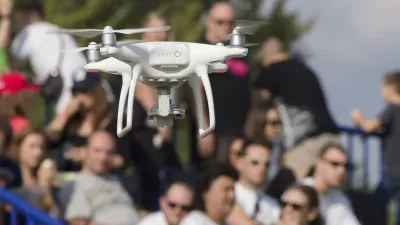A Google-backed proposal to turn an underused section of Toronto waterfront into a tech hub holds relevant lessons about privacy and data.

Five years after the failure of Google-affiliated Sidewalk Labs’ proposal to build a hyperconnected, tech-forward planned community in Toronto, Stephen Goldsmith reflects on the lessons that planners learned — and forgot — from the experiment.
For Goldsmith, the project created questions about privacy, digitally connected cities, and data handling. “If anything, the landscape has only gotten more complex, dispersed and high-stakes.”
New mobility services, connected vehicles and on-demand deliveries track the movements of people and goods across cities. An explosion of video cameras, license plate readers, drones and biometric tools monitor public spaces and promise better safety and enforcement. Sensor networks optimize services by capturing endless data streams on peoples’ health, energy use, parking and more.
Goldsmith argues that, while there is a net benefit to the growth of this technology, civic leaders must take proactive steps to protect citizens’ privacy and understand how data is being captured, monitored, and used. Cities must also “set clear policies for external partners” and offer complete transparency around data collection.
For Goldsmith, “When it comes to balancing technology’s benefits and risks in urban environments, the story is just getting started, and local leaders need to keep up with it.”
FULL STORY: Lessons From a Failed Tech Urbanist Dream

Maui's Vacation Rental Debate Turns Ugly
Verbal attacks, misinformation campaigns and fistfights plague a high-stakes debate to convert thousands of vacation rentals into long-term housing.

Planetizen Federal Action Tracker
A weekly monitor of how Trump’s orders and actions are impacting planners and planning in America.

San Francisco Suspends Traffic Calming Amidst Record Deaths
Citing “a challenging fiscal landscape,” the city will cease the program on the heels of 42 traffic deaths, including 24 pedestrians.

Half of Post-Fire Altadena Home Sales Were to Corporations
Large investors are quietly buying up dozens of properties in Altadena, California, where a devastating wildfire destroyed more than 6,000 homes in January.

Opinion: What San Francisco’s Proposed ‘Family Zoning’ Could Really Mean
Mayor Lurie is using ‘family zoning’ to encourage denser development and upzoning — but could the concept actually foster community and more human-scale public spaces?

Jacksonville Launches First Autonomous Transit Shuttle in US
A fleet of 14 fully autonomous vehicles will serve a 3.5-mile downtown Jacksonville route with 12 stops.
Urban Design for Planners 1: Software Tools
This six-course series explores essential urban design concepts using open source software and equips planners with the tools they need to participate fully in the urban design process.
Planning for Universal Design
Learn the tools for implementing Universal Design in planning regulations.
Gallatin County Department of Planning & Community Development
Heyer Gruel & Associates PA
JM Goldson LLC
City of Camden Redevelopment Agency
City of Astoria
Transportation Research & Education Center (TREC) at Portland State University
Jefferson Parish Government
Camden Redevelopment Agency
City of Claremont




























